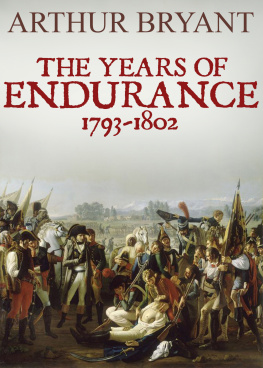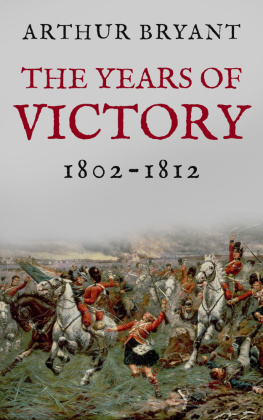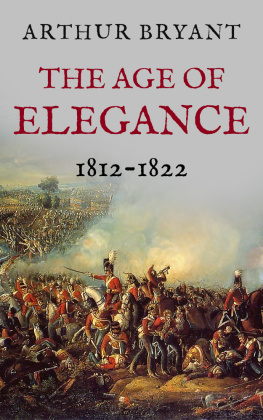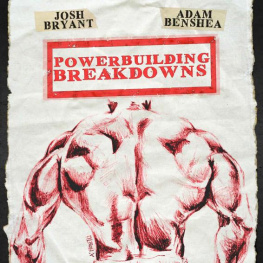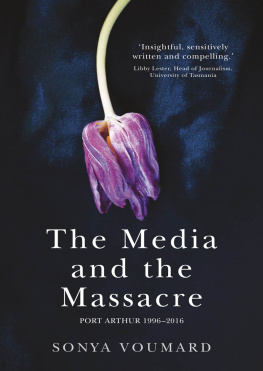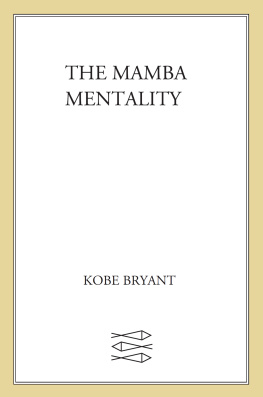THE YEARS OF ENDURANCE
1793-1802
ARTHUR BRYANT
Arthur Bryant 2013
Arthur Bryant has asserted his rights under the Copyright, Design and Patents Act, 1988, to be identified as the author of this work.
First published by The Reprint Society Ltd by arrangement with W.M Collins Sons and Co Ltd in 1944
This edition published by Endeavour Press Ltd in 2013
To A. L. Rowse
In Common Devotion to the English Past
"I am not at all afraid for England
we shall stand till the day of judgment."
Pitt .
Table of Contents
PREFACE
The British fight against the attempt of a revolutionary France to dominate the world lasted twenty-two years. It began in 1793 when men who had set eyes on Protector Richard Cromwell were still living, and ended in 1815 when others who were to know the youth of Adolf Hitler were already born. It saw the end of an old age and the beginning of a new.
In that struggle there were only two constant factors. One was the French resolve to create a New Order; the other was the British refusal to admit any Order not based on law. Other nations were tossed in and out of the storm like leaves. Only Britain, though she bent, never broke. For a generation, sometimes with powerful allies but as often alone, she fought on against a nation with twice her population and animated by a strange revolutionary fanaticism which gave its devotees the strength of a man in delirium. Such was its power that at times Britain found herself fighting almost the whole of Europe, including her former allies, without, apparently, the slightest chance of victory and with very little of survival.
Yet her patient, rock-like people never compromised, never gave in, never despaired. They had no Churchill to lead them, for Pittthe pilot who weathered the early stormswas Chatham's son only in his faith and fortitude but by no means in his understanding of war, in which at first he was the veriest bungler. After three years in which Britain lost almost all her allies and reached the verge of bankruptcy, her enemy threw up the greatest military genius the world had known. For thirteen years, until Sir John Moore twisted his tail in Spain, no soldier got the better of Napoleon or, save for the stubborn Russians for a few months in the Polish mud of 1806, was even able to stand up to him. "The in-isled Ararat, on which the ark of the hopes of Europe and of civilisation rested, "alone survived.
Survived and triumphed. Amid the wreck and misery of nations it is our joint exaltation that we have continued superior to all that ambition and despotism could effect; and our still higher exaltation ought to be that we provide not only for our own safety but hold out a prospect to nations now bending under the iron yoke of tyranny what the exertions of a free people can effect. The voice is not Churchill's but Pitt's: the year not 1940 but 1804.
For this is not the first time Britain has faced a Continent overrun by a tyrant or seen her allies, one by one, beaten out of the field by seemingly omnipotent force. When France collapsed in 1940 and her coasts became Hitler's, some, remembering how desperately we fought in 1914 and 1918 to save the Channel ports, felt that our case was desperate. It was happy for England that at that hour she had as Prime Minister a man who was not only a master orator but also an historian, and who knew that the lonely and desolate place in which his country stood was one in which she had stood before. He saw her, awakened and restored by adversity, fulfilling her supreme historic function: the faithful custodian of human law and liberty in the hour when others fell or slept. Until younger nations should awake to join her, he gave her the faith to endure.
It is to enshrine the lessons of that earlier war that I have written this book. The present volume covers only its first decade: that which ended with the Peace of Amiens. But it is the part of the war about which least is generally known and that to which our own struggle has borne till now the closest affinity. Trafalgar and Waterloo were so engraved on the mind of the nineteenth century that men forgot what preceded them and alone made them possible.
I have tried to portray the British people on their long pilgrimage of endurance and to show, shining through all their mistakes, what Pitt called the virtues of adversity endured and adversity resisted, of adversity encountered and adversity surmounted. Because the duration of the conflict robbed it of unity, I have not attempted to compass it in a single volume. It was two wars, not one. In the first the combatants only reached the stage at which a final victory for Britain became possible by fighting themselves to a temporary standstill. They had to pause in order to be able to go on at all. Few British statesmen imagined that the truce of exhaustion negotiated at Amiens could be anything but temporary. But it was necessary to prove to a war-worn people that, though revolutionary France had ostensibly changed its rulers and principles and substituted the despotism of a professional soldier for that of political dictators, it was still a State with which it was impossible to remain at peace. Like ourselves after Munich, our ancestors tried the experiment of living with and letting live a Europe in which there was no balance of power but only unilateral force. Within a year the experiment had failed. When the war began again it was a new war. Yet the foundations of victorythe theme of my sequelhad already been laid.
This is the story of how they were laid. They were compounded of errors and follies, of failures and recoveries, of bitter disappointments bravely borne, of experience and dawning realisation, above all of courage, resolution and endurance. The scene of battle ranged from the swamps of the Caribbean to the sands of the Egyptian desert, from the dark waters of Lough Swilly and the Sound to the blue of the Malacca Straits and the Indian Ocean. The mechanical and tactical devices of war were utterly different from those of today; the human and strategical problems strangely similar. Weapons and methods of manufacture and transport change much in five generations. Human and national characteristics, geography and the laws of war change little.
Within these pages the reader will find many of the familiar phenomena of our own troubled time. He will see on the Continent the corruption and final breakdown of an outworn society, and the emergence from its collapse of a dynamic and revolutionary force operating not in the peaceful vacuum of a university classroom but in the most powerful military nation in Europe. He will see the early enthusiasm to which that national rebirth gave rise turned into a terrible instrument of force by the cruel and purposeful men who rose on its waves to power. He will see the proscription, imprisonment and murder of political opponents, the denialin the name of liberty and patriotismof all freedom of speech and, as the appetite for blood grew, an orgy of sadistic cruelty, indulged not only as a deliberate instrument of policy but, by the baser sort of Jacobin, for its own sake. He will see mass hatred employed as a motive force and ideological ends held out as justifying every means, however base and destructive. He will see a Great Nation denying all morality but the pursuit of its own interests and using, as part of its technique of conquest, a propaganda appealing to diametrically contradictory interests and a diplomacy which pretended peace while planning war and which overran its victims' territories by hordes of agents acting as the advance guard of armies. He will see its unconscious allies or dupes in every decaying eighteenth-century State turned by war into fifth columnists and by defeat into quislings."

